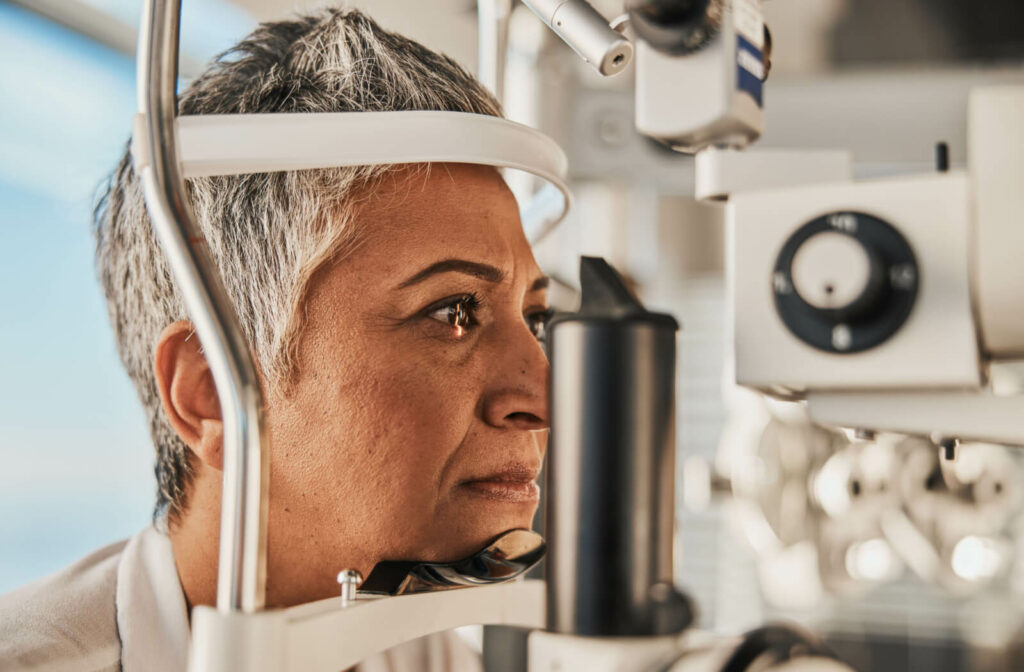The human eye is a complex organ, responsible for capturing light and converting it into the images that define our visual experience. Sometimes, however, the perfect image can be marred by small problems, like black spots in your vision. These can be a source of anxiety for many people, especially when they appear suddenly.
Black spots in your vision can be an indication of a number of different eye conditions, some more serious than others. But they could also be floaters—often-harmless, tiny little specks that float into your field of vision.
If you notice you have black spots in your vision, you should visit your optometrist so they can properly diagnose the cause.
Is It Bad to Have Black Spots in My Vision?
One of the most common causes of black spots in vision is floaters. These are tiny specks or strings that float into your field of vision, often appearing as black or gray spots. These floaters are caused by small pieces breaking loose within the inner back portion of the eye. While they may seem alarming, they’re usually harmless. They’re often a natural part of the aging process.
However, floaters aren’t the only cause of black spots in vision. There are several other eye conditions that can result in these visual disturbances. It’s important to be aware of these potential causes, as these black spots can be an indication that a more serious condition is developing.
If you notice these black spots appearing more often than before, visit your optometrist for a comprehensive eye exam for a proper diagnosis.
Macular Degeneration
Macular degeneration, often called age-related macular degeneration or AMD, is a condition that affects the central part of the retina, known as the macula. This part of the retina is responsible for clear, sharp, central vision. But over time, it can begin to break down and cause symptoms like:
- The loss of your central vision
- Blurry, cloudy, or dark spots in your vision
- Blurry vision
- Light sensitivity (photophobia)
- A noticeable decrease in your color perception
AMD is commonly associated with aging and can lead to black spots in vision. Early intervention can help preserve your vision.
Diabetic Retinopathy
Diabetic retinopathy is an eye condition that can affect people with diabetes. It typically occurs when high levels of blood sugar damage the blood vessels in the retina—the light-sensitive tissue at the back of the eye. These blood vessels can weaken the retina over time and cause significant damage.
If left untreated, this condition can cause the development of abnormal blood vessels in the back of the eye. These new blood vessels can leak and break open, letting fluids into your eye that shouldn’t be there. These blood vessels—and the fluids—can cause buildups of material that obstruct light from reaching your retina.
This can result in black spots appearing in your vision, particularly if the condition has progressed to an advanced stage.
Retinal Detachment
Retinal detachment is a serious condition that occurs when the retina pulls away from the tissue around it. If left untreated, this condition can lead to significant permanent vision loss. It’s important to note that retinal detachment is often considered a medical emergency—if you believe you’re experiencing this condition, seek medical attention from your eye doctor or an emergency clinic immediately.
There are several potential causes for a sudden retinal detachment:
- Age-related changes in the eye weakening the surrounding tissue of the retina
- Sudden trauma or impact to the area around the eye
- Complications from a previous eye surgery
- A family history of retinal detachments
This condition can cause:
- Sudden flashes of light
- Shadows moving across your vision, like a dark curtain surrounding your field of vision
- Blurry or distorted vision
- A significant loss of peripheral or central vision
A retinal detachment can also cause floaters to appear as detached pieces can obstruct your vision.

What Should I Do if I Have Black Spots in My Vision?
If black spots have appeared in your vision, you should visit your optometrist for a comprehensive eye examination or emergency appointment. In many situations, black spots are harmless floaters. However, they can be a sign of more serious conditions that require immediate attention.
Visit us at Griffin Optometric Group. Our team can help determine what may be causing black spots in your vision and we can provide appropriate treatment to clear up your vision. Book an appointment with us today.



